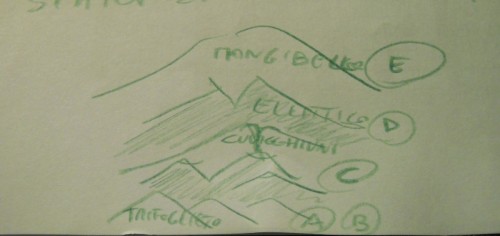Stefano Rossignoli 7 febbraio 2012
Ho paura che ci vorrebbe anche il capitolo terzo e poi quarto, ma domani non potrò andarci e nei prossimi post state tranquilli che qualcosa di ciò che ho imparato, notato, capito ed estratto da queste giornate ci sarà per forza…
Oggi, mentre prendevo freneticamente pagine di appunti durante la spettacolare presentazione riguardo l’attività svolta sull’Etna (svolta da una miriade di persone) mi arrovellavo pensando come recuperare qualche immagine in proposito (per ora ho solo gli appunti).

Immaginate per questo lavoro 10 tesi di Laurea e 4 di Dottorato solo a Milano e tante altre (incalcolabili dice lui!!!) in altri luoghi e Città …e anni di lavoro per ottenere la carta geologica, la struttura e la storia del nostro grande Vulcano di Casa, che prima o poi dovrò andare a vedere …mentre erutta spero…
Ho appreso a grandi linee la storia del vulcano durata circa 500000 anni e un giorno mi piacerebbe raccontarvela e chissà mai che lo farò, in stile scienzafacile, semplificata ma non banalizzata, magari chiedendo qualche dritta al bravissimo relatore Gianluca Groppelli che oggi si è preso i miei complimenti, per quel che valgono…
Per ora vi dico solo che la base del vulcano è fatta da lave eruttate in ambiente sottomarino (le classiche lave a cuscino dette pillows all’Inglese!) e che il 90% della copertura lavica che si vede è degli ultimi 15000 anni (e di quest’ultima attività sono state individuate circa 400 colate). Questo ci dà già abbastanza un’idea di quanto possa essere articolata la storia del vulcano e il suo studio…
La faccenda poi si complica quando i relatori di Geofisica presentano i lavori di analisi della resistività elettrica e della elettrostratigrafia, argomenti troppo lontani dai miei per essere in grado di spiegarveli.
Mi rendo conto però ad esempio che i loro metodi sono utili nell’indagine del sottosuolo delle vecchie miniere italiane dismesse (circa 2400) e causa di un enorme impatto ambientale passato, attuale e futuro. Con questi metodi di indagine i geologi sono in grado di reperire le discariche di minerale già sfruttato che è povero economicamente in metalli ma troppo ricco per l’ambiente circostante…
E’ interessante vedere come stanno studiando alcune specie vegetali in base alla loro capacità di assorbire e/o neutralizzare alcuni elementi inquinanti tramite le micorrize (ovvero una simbiosi delle loro radici con alcuni funghi) delle loro radici…
Non meno interessanti gli studi di geochimica su fluidi a base di Carbonio Ossigeno e Idrogeno (detti COH) e lo studio delle proprietà di alcuni minerali silicati (con silicio e ossigeno), minerali con particolari microporosità molto stabili (come forma) ad altissime pressioni, studiati come probabili contenitori di elementi radioattivi delle scorie ad esempio…
Mi vengono però un paio di commenti negativi su un intervento del pubblico che all’affermazione che ci sono almeno 1600 miniere su cui lavorare per capire almeno se bisogna intervenire con un ripristino ambientale oppure no e lui dice che non è vero che non si interviene.
A questo punto, visto che è il mio blog e posso dire la mia, dico che non mi basta e non deve bastarci sapere che in alcune regioni stanno investendo tantissimo per il ripristino ambientale. E’ ancora troppo poco e tutto andrebbe ripristinato e il lavoro di ricerca di metodi sempre più precisi e di conseguenza anche più facili da pianificare ed economici non si deve fermare e non deve essere sottovalutato dai geologi che son sempre più impegnati nella caccia alle risorse mentre una piccola fetta per fortuna si occupa di cercare di gestirne lo sfruttamento e soprattutto di rimediare ai danni dello sfruttamento stesso.
Il secondo intervento negativo è riguardo agli studenti. Io sono stato alle Giornate Assereto un mattino e due pomeriggi ed ho visto forse 5 studenti, forse! Allora mi vien da dire:”Perchè gli studenti non ci vanno a queste occasioni di capire un po’ di più a cosa serve quel che studiano?”
Certo, questo è periodo di esami e gli studenti attuali sono iper-impegnati a gestire anche 6 o 7 microcorsi (preparatori in modo dubbio data l’impossibilità di approfondimento dettata dai tempi stretti). Certo è proprio un peccato.
Penso che una pianificazione più intelligente dei corsi con anche l’integrazione di queste giornate di approfondimento potrebbe portare più studenti ad alto livello di preparazione in un po’ più di tempo …e magari, anzi certamente, porterebbe meno studenti alla laurea, cosa non certo positiva per chi non ci arriva, ma non è sempre vitale laurearsi…
Mi sembra di capire, leggendoti da ignorante in geologia, che la ricerca in questo campo, secondo te, sia volta soprattutto alla ricerca di risorse sfruttabili e si dedichi molto poco agli studi che riguardano l’impatto ambientale. Mi vien da dire che questo è un problema che si ritrova in molti campi della ricerca scientifica: i progetti di ricerca spesso seguono trend socio-economici o anche semplici “mode”. Penso che dipenda da entrambe le parti, da chi già lavora nell’università sicuramente in misura maggiore, ma anche dagli studenti. Come hai notato tu, spesso “macinare esami” diventa l’obiettivo preponderante negli studenti di oggi mentre spesso tendono a credere che idee un po’controcorrente o semplicemente nuove non porteranno da nessuna parte… L’educazione al pensiero indipendente dovrebbe essere favorita fin dalla scuola primaria, servono più iniziative per questo!
Ciao Caterina!
Credo di si, che in Geologia, i campi di ricerca che ‘fruttano’ denaro siano quelli della ricerca delle risorse.
Questo non vuole dire che la ricerca geologica volga solo e principalmente su quello, ma ho semplicemente il dubbio (in realtà ne sono quasi certo!) che se non ci fosse la ricerca per le risorse, non ci sarebbe la possibilità economica per le altre ricerche.
Ho rispetto per la ricerca delle risorse. Non ho rispetto per il modo in cui vengono sfruttate (o si viene indotti a sfruttarle) e distribuite ma sarebbe molto difficile da spiegare il meccanismo che mi infastidisce e spaventa in questo semplice commento. Forse non basterebbe un libro!!!
Grazie mille per il tuo commento!
A presto.
Stefano!